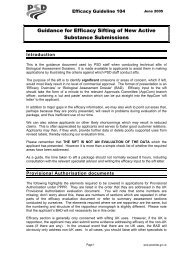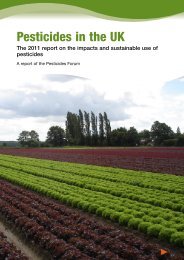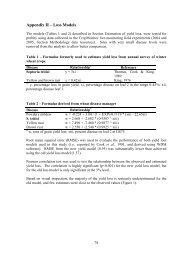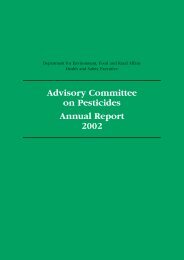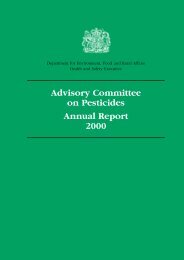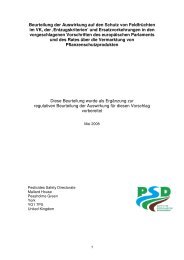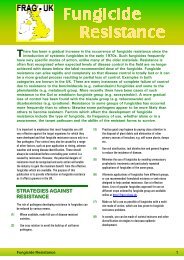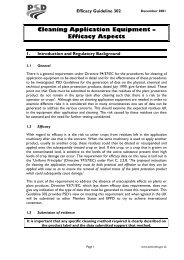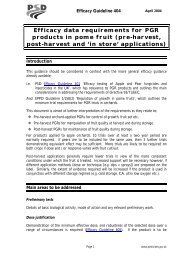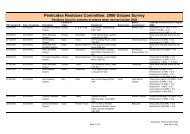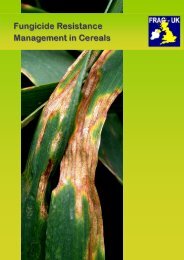Advisory Committee on Pesticides Annual Report 2001
ACP Annual Report 2001 - Pesticides Safety Directorate
ACP Annual Report 2001 - Pesticides Safety Directorate
Create successful ePaper yourself
Turn your PDF publications into a flip-book with our unique Google optimized e-Paper software.
<str<strong>on</strong>g>Advisory</str<strong>on</strong>g> <str<strong>on</strong>g>Committee</str<strong>on</strong>g> <strong>on</strong> <strong>Pesticides</strong> <strong>Annual</strong> <strong>Report</strong> <strong>2001</strong><br />
agreed that the current default assumpti<strong>on</strong> that corn oil administrati<strong>on</strong> was an<br />
acceptable model for dietary exposure was supported. It was suggested that,<br />
if applicants wished to make a case for reduced bioavailability in respect of<br />
specific crops and pesticides, the <strong>on</strong>us should be <strong>on</strong> them to submit data to<br />
support such a case.<br />
The <str<strong>on</strong>g>Committee</str<strong>on</strong>g> recommended that the research be submitted for publicati<strong>on</strong><br />
in a peer-reviewed scientific journal.<br />
76<br />
Comparative risk assessment<br />
The ACP was asked by Ministers to c<strong>on</strong>sider the value of comparative<br />
assessment and substituti<strong>on</strong> in the regulati<strong>on</strong> of pesticides. At the July meeting<br />
it was agreed that PSD should issue a c<strong>on</strong>sultati<strong>on</strong> letter seeking views from<br />
approval holders, users, c<strong>on</strong>sumers and envir<strong>on</strong>mental interests. Following<br />
this, the ACP began to develop possible schemes for comparative assessment,<br />
taking account of the resp<strong>on</strong>ses to the c<strong>on</strong>sultati<strong>on</strong>. During 2002, the<br />
<str<strong>on</strong>g>Committee</str<strong>on</strong>g> will c<strong>on</strong>tinue to c<strong>on</strong>sider these opti<strong>on</strong>s, together with related issues<br />
of relevance to the re-negotiati<strong>on</strong> of the Pesticide Authorisati<strong>on</strong> Directive<br />
(91/414/EEC).<br />
Degradati<strong>on</strong> of chlorothal<strong>on</strong>il residues prior to analysis –<br />
follow-up report<br />
During Pesticide Residues <str<strong>on</strong>g>Committee</str<strong>on</strong>g> (PRC) routine m<strong>on</strong>itoring in 1994, it was<br />
noted that fortified residues of chlorothal<strong>on</strong>il were being ‘lost’. A study was<br />
initiated to examine the extent and possible mode of the degradati<strong>on</strong> in five<br />
crops: lettuce, <strong>on</strong>i<strong>on</strong>, celery, broccoli and lem<strong>on</strong>.<br />
The study was c<strong>on</strong>sidered at the November 1994 ACP meeting. The results<br />
showed that significant losses were occurring as a result of comminuti<strong>on</strong> and<br />
freezer storage and/or storage of extracts at room temperature prior to<br />
analysis. These losses were greatest in lettuce, celery and <strong>on</strong>i<strong>on</strong>s and less in<br />
broccoli and lem<strong>on</strong>s. If lettuce was ‘killed’ by microwaving prior to storage<br />
and analysis, losses were greatly reduced, indicating that the problem was<br />
likely to be enzymatic degradati<strong>on</strong>. The ACP had recommended that a further<br />
study be c<strong>on</strong>ducted <strong>on</strong> the fate of chlorothal<strong>on</strong>il residues during processing<br />
and analysis of lettuce and <strong>on</strong>i<strong>on</strong>s.<br />
The follow-up study was c<strong>on</strong>sidered at the June 1997 ACP meeting. The<br />
results showed that losses of chlorothal<strong>on</strong>il and also dichlofluanid could be<br />
minimised by cryogenic milling of lettuce samples and extracting the subsamples<br />
partially frozen. In the case of <strong>on</strong>i<strong>on</strong>s, the use of cryogenic milling




